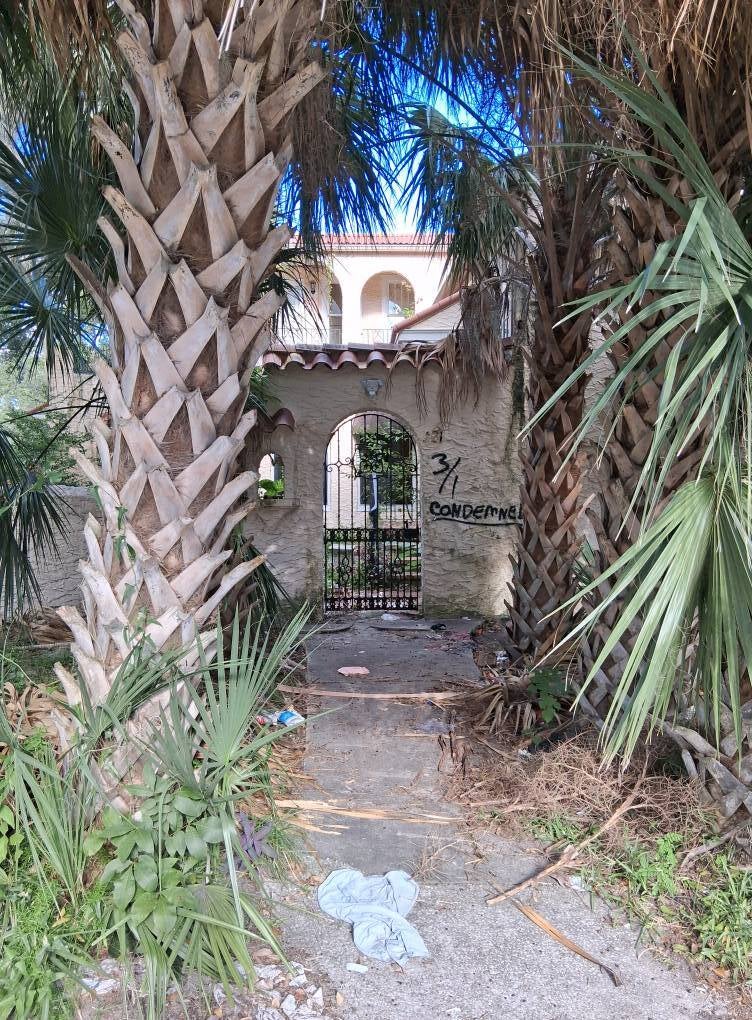
Daytona Beach, FL — A once-functional treatment center at 921 South Ridgewood Avenue has become a symbol of neglect and growing concern for residents of Daytona Beach. Condemned in March 2025, the property now stands as a deteriorating shell—overrun by weeds, rodents, and illicit activity—casting a long shadow over the surrounding community.
The building, previously operated by Immuno Genic Corp, a foreign for-profit entity, was used as a private treatment facility. However, the company’s legal standing in Florida collapsed after it failed to file its annual report, with the last submission recorded in 2022. State records confirm that the corporation was administratively dissolved, and attempts to reach the business have been futile. The listed phone number is disconnected, and no representatives have responded to inquiries.
What remains is a property in freefall. Overgrown vegetation has swallowed the yard, the structure shows signs of decay, and neighbors report a steady stream of squatters, drug activity, and late-night disturbances. “It’s heartbreaking,” said local resident and business owner Terrence Moore. “This used to be a place of healing. Now it’s a hazard.”
The home’s location—on a prominent corner of South Ridgewood Avenue—makes its decline especially visible. Once considered a gateway to the corridor, the site now attracts loiterers and has become a hotspot for criminal activity. Residents have documented everything from discarded needles to makeshift encampments. The city has received multiple complaints, and code enforcement officers have cited the property for health and safety violations including pest infestation, mold, and structural instability.
The deeper concern lies in the property’s former use. Immuno Genic Corp operated what appeared to be a treatment center, though records are sparse. It remains unclear whether the facility was licensed, what kind of care was provided, and how many individuals may have been served. The lack of transparency surrounding the corporation’s operations—and its abrupt disappearance—has prompted calls for investigation.
“This is more than just a blighted building,” said community advocate Jasmine Alvarez. “It’s a failure of oversight. We need to know who was responsible, what safeguards were in place, and why the city didn’t intervene sooner.”
City officials are reportedly exploring legal remedies, including nuisance abatement, lien enforcement, and potential seizure of the property. The situation has also sparked broader conversations about the vulnerability of neighborhoods when corporate entities abandon properties without accountability.
Local nonprofits and housing advocates are urging the city to act swiftly—not only to clean up the site but to ensure that similar situations don’t unfold elsewhere. “We’re seeing a pattern,” said Thomas Reilly, who leads a coalition focused on urban renewal. “Condemned properties become magnets for instability. If we don’t address this now, it will spread.”
As Daytona Beach grapples with rising homelessness, addiction, and housing insecurity, the fate of 921 South Ridgewood Ave stands as a litmus test for how the city responds to crisis. For now, the community watches and waits—hoping that accountability, cleanup, and renewal will follow.
Add comment
Comments